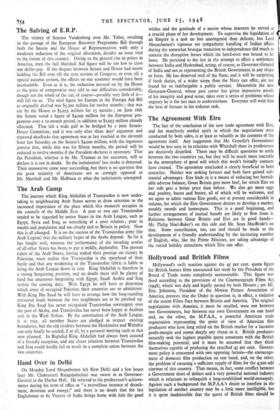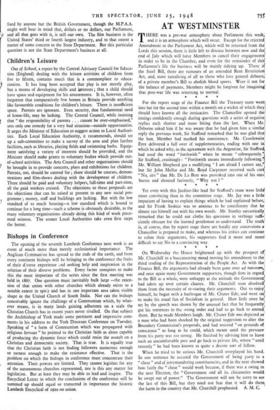Hollywood and British Films
Hollywood's swift reaction against the 45 per cent. quota figure for British feature films announced last week by the President of the Board of Trade seems completely unreasonable. This figure was fixed according to the provisions of the Cinematograph Films Act. (1948), which was duly and legally passed by both Houses ; yet Eric Johnston, President of the Motion Picture Association of America, protests that the Order in question is, in effect, a violation of the recent Films Pact between Britain and America. The original negotiations with America, it must be recalled, were not between two Governments, but between our own Government on one hand and, on the other, the M.PAA., a powerful American trade organisation representing the point of view of American film producers who have long relied on the British market for a lucrative profit-margin and resent deeply any threat to it. British producers naturally seek the highest possible quota consonant with the British film-making potential, and it must be assumed that they think themselves capable of producing the specified 45 per cent. Govern- ment policy is concerned with two opposing factors—the encourage- ment of domestic film production on one hand, and, on the other, the problem of ensuring a sufficient supply of films for the 4,500 odd cinemas of this country. That means, in fact, some conflict between a Government short of dollars and a very powerful national industry which is reluctant to relinquish a long-established world-monopoly. Against such a background the M.PAA.'s desire to interfeke in the legislation of another country may be a little more intelligible, but it is quite inadmissible that the quota of British films should be fixed by anyone but the British Government, though the M.P.A.A. might well bear in mind that, dollars or no dollars, our Parliament, and all that goes with it, is still our own. The film business is the United States' third or fourth largest industry, and to that extent a matter of some concern to the State Department. But this particular question is not the State Department's business at all.































 Previous page
Previous page